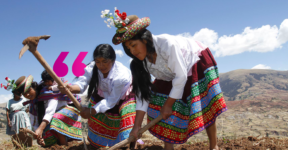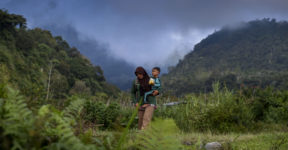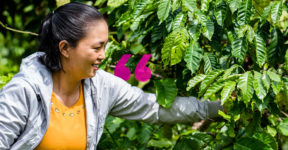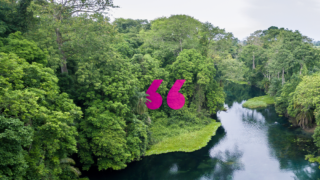
Forest Voices: ‘The new Forest Code is a law to be proud of.’
Inès Mvoukani is a legal expert who played a pivotal role in the creation of the Republic of the Congo’s new Forest Code. She explains the challenges of collaborating with the government, how the new law will aid forest communities and why it’s crucial for civil society to have a seat at the negotiating table.
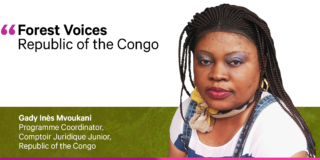
‘You should have been there to witness it. In every meeting, people were yelling at each other and having a go at each other. There were times when we were really desperate. We thought we would never achieve anything. But we got there and here we are with a law that we’re proud of.’
Inès Mvoukani is the project coordinator at Comptoir Juridique Junior in Brazzaville in the Republic of the Congo. For eight years of arduous negotiation between the government and civil society, Inès helped develop the new Forest Code, which was finally passed in July 2020.
The country’s forest forms part of the Congo Basin, the world’s second biggest rainforest. Preserving this forest is critical for mitigating climate change and will require rigorous governance to reduce deforestation and enable sustainable land use. The new code marks a significant step towards this.
Civil society organizations have set out to ensure the new code benefits forest communities who are often marginalized and discriminated against. Ultimately, around two-thirds of their suggestions were enshrined in the new law.
Indeed, the negotiation process has also resulted in a better working relationship between civil society and the government, strengthening their position in advocating for the rights of forest peoples.
‘The government could have just locked themselves in their offices and written a law that suited them. But instead, we had a collaborative process,’ says Inès.
The collaborative approach to drafting the code was the result of the country’s Voluntary Partnership Agreement (VPA) with the EU that was signed in 2010. The Republic of the Congo was the first country in the region to sign a VPA, a treaty which aims to ensure that timber and timber products exported to the EU are logged legally. This entails establishing a multi-stakeholder process to review the country’s laws and decide on how to define legal timber.
‘Some issues were raised in the VPA that had no legal basis so additional reform was needed,’ says Inès. ‘So we strengthened the existing Forest Code by integrating emerging new themes and taking into account sustainable management.’
Inès participated in a civil society legal working group which received technical and financial support from the environmental charity, ClientEarth, where she is an in-country associate.
The working group is the legal arm of the Plateforme pour la gestion durable des forets (PGDF) – a coalition of civil society organizations – and looks at legal matters around forest governance in the Congo.
During the reform process, it operated as a mechanism through which members could improve their legal advocacy skills and ability, making them better positioned to negotiate the code’s content with the Congolese government.
‘During these eight years we had lows and highs, we had good moments and bad moments, we encountered difficulties and misunderstandings. But because the VPA requested that all stakeholders would be taking part, the Ministry [of Forest Economy] always had to come back to the table and we carried on the process together,’ explains Inès.
‘Beyond just setting up principles, the VPA built a culture of inclusion,’ adds Teodyl Nkuintchua, country manager for the Republic of the Congo at the World Resources Institute. ‘For Congolese authorities, it became no longer an exception to have all stakeholders involved – it became standard. The VPA paved the way for that.’
It has been estimated that up to 70 per cent of logging in the Republic of the Congo is conducted illegally and this exploitation is threatening the country’s forest resources and the livelihoods of its communities – many of whom depend on the forests for food, medicine and materials.
‘Indigenous peoples live in a linked way with the lands and forests. They thrive by living in harmony with their environment,’ says Patrick Kipalu, director of the Africa Programme at the Rights and Resources Initiative.
‘Because of their style of living, they are discriminated against and their involvement in the political life of the country is very limited.’
Civil society’s involvement in the drafting process meant they could push for laws that consider all who work and live in the forests. As a result, the code marks the first time that the right of forest peoples to participate in forest governance has been written into law in the Republic of the Congo.
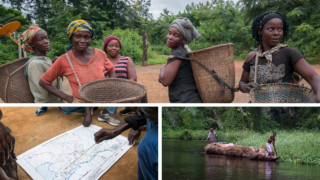
Images – Forest communities in the Republic of the Congo. The new Forest Code enshrines their rights into law for the first time, helping them to manage their land. Photos (clockwise): Molly Bergen/WCS, WWF, WRI; European Forest Institute and Molly Bergen/WCS, WWF, WRI.
‘Civil society knows what the reality is on the ground,’ says Inès. ‘They can remind the government of the rights of communities which are important to take into account.’
In the new code, the rights of forest communities have been enshrined through the principle of free, prior and informed consent – known as FPIC – which enables them to participate fully and meaningfully in decisions that may affect them or their lands.
‘Before any action affecting communities takes place in the forest, they must now be consulted,’ Inès explains. ‘This was really a huge fight for us and to see it inscribed in black and white in the Forest Code is a great victory.’
In addition to the principle of FPIC, civil society has succeeded in ensuring the code enshrines community forestry schemes in law, allowing rural people to manage their resources.
Under the new law, communities can also perform independent monitoring of forest exploitation and bring cases of lawbreaking to court.
‘Communities, as well as NGOs, are now capable of seizing any redress mechanism. They can engage in legal action against the government when they feel that their rights have not been respected,’ explains Nkuintchua. ‘This is critical, because it really addresses the accountability needs that we had in the past.’
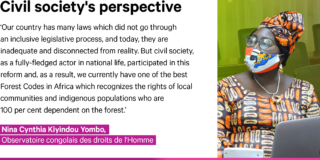
But for forest communities to be able to hold lawbreakers to account, they first must be informed about the law. ‘That’s why civil society is raising awareness and carrying out training with the local communities and indigenous people so that they know their rights and responsibilities,’ says Inès.
‘Not everybody was involved in creating the forest law but the law must be known to everybody so every one of us can react when faced with inequalities.’
The fact that communities themselves had no direct representation in the negotiation process has been pointed out as a potential area for improvement by experts.
‘It's always important and more effective for communities to speak for themselves,’ says Kipalu. ‘It makes a big difference when spaces of political discussions are created to open opportunities for communities to sit around the table with decision-makers.’
But civil society organizations sought to overcome this through engaging in extensive, open dialogue with communities across the country so that they could accurately represent their requirements.
‘When the process started, civil society organizations, along with ClientEarth, organized consultations at the community level in the forest areas and we talked with the communities first-hand,’ says Inès. ‘We listened to the problems that they were facing and their needs were transformed into priorities.’
‘I’m motivated to do this work every day for the wellbeing of indigenous people and local communities. It’s crucial that communities can manage the areas where they live. We must help them preserve the forests and move towards participative management so that we can achieve sustainable management of forest resources.’
While the inclusion of community rights in the Forest Code was a long and hard fight, it was an ultimately successful one, and those involved in the negotiations in Brazzaville have much to teach civil society organizations elsewhere who are entering into conversations with the government.
‘To be successful in negotiations, civil society must speak with one voice,’ explains Inès. ‘They must master all of the issues and make proposals that are strong and relevant. This is only possible if they really know the issues they’re tackling inside and out.’

Image – Inès Mvoukani speaks at the 11th Forest Governance Forum in 2018. Photo: CIDT.
‘Don’t see other stakeholders as the enemy. Work together with them. Be aware that during the negotiation process there will be disagreements but try to resolve those disagreements, not by trying to be more forceful than the other party, but by talking.’
‘Follow the process day by day. Ask the different stakeholders to have a very clear timetable and a clear roadmap.’
‘Ultimately, be well organized. Everything depends on that.’
Source: ClientEarth
Beyond civil society’s engagement, there are external factors which Inès also notes were crucial in the success of the legal reform.
‘At one point, when we felt that we couldn't move forward with the Ministry of Forest Economy, we started advocacy in parliament and we were joined by the private sector which really strengthened our position. That's how we managed to reach the result that we have now.’
‘[But] it’s also largely because of the VPA agreement – the fact that we could all sit together and exchange.’
Inès also notes the partnership with ClientEarth as significant. ‘They gave us funds to enable all stakeholders to attend the meetings and they trained civil society organizations to analyze legal documents. All of these measures allowed this process to take place.’
‘Stakeholder participation is essential to ensuring that the outcomes of the legal reform process are equitable, coherent and empowering and that the new laws are implemented effectively,’ explains Tanja Venisnik, community forestry lead at ClientEarth.
‘Multi-stakeholder processes contribute to better law design and help create more equitable laws that have wide stakeholder buy-in. This in turn improves implementation and enforcement.’
However, despite civil society’s achievements, there were ultimately areas where they had to compromise.
‘Not all our concerns were taken into account,’ says Inès. ‘For example, in terms of deforestation, some safeguards were put in place but we think the administration must go further.’
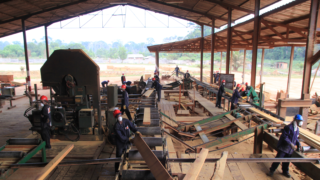
Image – Workers in a sawmill in Ipendja, Republic of the Congo. Photo: European Forest Institute.
‘There is also the problem of access to information for forest communities – this is always a big challenge.’
In addition, there are some concerns around the codification of community forest schemes. One area where clarification is needed, for example, is in the relationship between the Forest Code and the land law. ‘Communities can have rights over the forest, but if they don't have those same kinds of strong rights on their customary lands, then there will be a problem,’ explains Kipalu.
The implementing decrees of the Forest Code, which have yet to be set out, will be pivotal for how effective the law is in practice. ‘They must be very clear and address and resolve all issues so as to avoid potential conflicts,’ says Inès.
'Civil society needs to be more proactive,’ adds Nkuintchua. ‘They cannot just leave this to external consultants. They really need to keep the pressure on, not just on the government, but all stakeholders and let them know it’s too early to start resting on their laurels. They need to make sure that the law provides what it promised.’
However, Inès maintains that the negotiating process has made civil society organizations well-equipped to face this crucially important task. ‘Civil society really did improve their capacity for better legal analysis and contributions.
‘They have improved their level of advocacy, and thanks to this process, civil society’s credibility has been strengthened with the different stakeholders.
‘When I see this law, and how participatory it is, I'm proud of it. Although certain provisions are not a priority for civil society, everything that was included was important for at least one of the stakeholders that took part.’
Ultimately, Inès hopes that the legislation will serve everybody. ‘The law defends the rights of all who live in the forests.’
If countries are to succeed in tackling deforestation and climate change, rigorous legal frameworks are needed that reflect the needs and priorities of all those who live in, and depend on, forests and their resources.
- Participatory legal processes are of critical importance in developing forest sector laws that are equitable.
- Implementing such processes requires a willingness to collaborate and to make compromises on the part of both government and civil society. International agreements can facilitate a shift to more openness in law-making as has been seen with the Congo-EU Voluntary Partnership Agreement.
- To engage effectively in participatory legal reform processes, civil society organizations must have sufficient expertise and resources and they should work together to try and establish a common position. Donors have a valuable role to play in supporting civil society to strengthen their capacity.
- Civil society organizations need to implement robust and extensive consultations with rural communities who often have limited access to information in order to ensure that they adequately represent their views.
- Civil society also has an important role to play in improving understanding of the law among all citizens so that they are able to hold their government to account and ensure that the law is implemented as intended.
This new set of stories aims to draw attention to the critical importance of good forest governance for achieving global commitments on biodiversity, climate change and poverty eradication. Through personal perspectives on a variety of approaches from around the world, the series seeks to highlight some of the lessons learned so far and what further action will be needed at the UN’s COP26 climate conference in November 2021 and beyond.
-----------------
Produced by Unfold Stories.
Written by Molly Millar. Graphics by Alex Sommers. Production by James Lovage.
The views expressed in this article are those of the experts interviewed and not of Chatham House.
